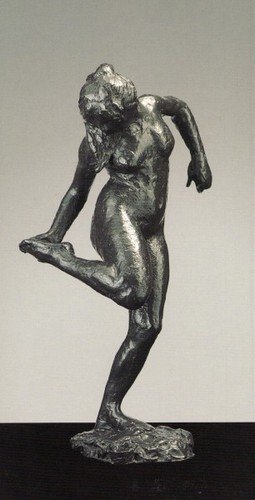Edgar Degas
dal 5/2/2009 al 2/5/2009
Segnalato da
5/2/2009
Edgar Degas
Hamburger Kunsthalle, Hamburg
Intimacy and Pose. The central theme of the exhibition is Degas' unique perspective on the female body. Unlike many of his contemporaries, Degas was not primarily interested in presenting staged poses in his sculptural work; he preferred to capture the posture and movements of women when they felt unobserved. His preoccupation with these private moments resulted in "intimate poses": dancers rehearsing ballet positions, tying their shoes or examining their feet; women combing their hair or washing themselves.

curated by Hubertus Gaßner and Dorothee Gerkens
In addition to his many well-known pastels and paintings, the French Impressionist Edgar Degas (1834–1917) also made numerous sculptures, but the large majority of these were never presented to the public. Shortly after his death, the figures of dancers, bathers and racehorses he had originally modelled in wax were secured, and in 1919 they were cast in bronze. The exhibition Intimacy and Pose presents the complete set of 73 original bronze casts. During his lifetime Degas only ever exhibited one of the wax sculptures – Petite Danseuse de Quatorze Ans (Little Dancer Aged Fourteen) – which caused a sensation at the Sixth Impressionist Exhibition in 1881 due to the remarkable naturalism of the figure.
The central theme of Intimacy and Pose is Degas’ unique perspective on the female body. Unlike many of his contemporaries, Degas was not primarily interested in presenting staged poses in his sculptural work; he preferred to capture the posture and movements of women when they felt unobserved. His preoccupation with these private moments resulted in “intimate poses”: dancers rehearsing ballet positions, tying their shoes or examining their feet; women combing their hair or washing themselves.
Above all, Degas depicts women waiting off-stage and at their toilette. By focussing on the work they have to invest in their bodies before appearing in public, he draws our attention to the care and disciplined training of the body, but also to moments of relaxation. This unidealised view of the unadorned female body and its preparation – a highly unusual perspective at that time and one which occasionally shocked viewers and critics – is also addressed in the impressive selection of drawings, pastels and paintings on show here alongside the bronze sculptures.
Degas himself once remarked upon his depictions of women: “Hitherto the nude has always been represented in poses which presuppose an audience. But my women are simple, honest creatures who are concerned with nothing beyond their physical occupations. It is as if you were looking through a keyhole.” The intimacy of the moment in no way exposes the subjects, however. Degas’ detached view instead captures the distinctive expression of the poses. His eschewal of staged femininity in favour of the aesthetic quality of the sculpture or picture is revolutionary in its approach.
A comprehensive catalogue has been published to accompany the exhibition, available from the museum shop for EUR 35.
Curators of the exhibition: Prof. Dr. Hubertus Gaßner and Dr. Dorothee Gerkens
The exhibition was previously presented at Fundación MAPFRE in Madrid, curated by Pablo Jiménez Burillo.
The sculptures have been generously loaned for this exhibition by the MASP, Museu de Arte de São Paulo, Assis Chateaubriand.
Press contact:
Mira Forte T +49 (0)40 428131204 F +49 (0)40 428542978 Mira.Forte@hamburger-kunsthalle.de
Hamburger Kunsthalle
Glockengiesserwall - Hamburg



